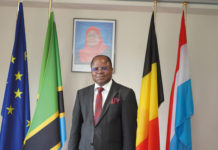What is your impression of the current socio-economic situation in South Africa?
Like many economies around the world, South Africa has substantially suffered from the Covid pandemic and the consequences of the Russian aggression against Ukraine. Many people lost their jobs during the pandemic – the unemployment level has reached 35% – and are still struggling to find a job. The country is also facing a long lasting energy crisis: power outages are daily and it has of course a negative impact on factories. Many companies work with generators, at least for part of the working day. Given the current energy prices, this is a huge expense for many of them. On the other hand, despite those currents difficulties, South Africa remains the most developed and diversified economy of the continent, and has a great potential for future investments: infrastructures (roads, railways, airports, etc.) are good although aging, the local workforce is very well trained, especially in high tech sectors, and the legal environment is conducive to investment.
How do you view the bilateral relations between Belgium and South Africa?
Belgium and South-Africa enjoy excellent bilateral relations on a broad range of topics. Last year we had multiple high level contacts between our officials in Brussels and in Pretoria. We cooperate, also through the regional governments in Belgium, on matters such as science and innovation, culture, education and much more… We are currently even planning a State Visit to South Africa in the course of next year, which is the highest level of official international engagement two countries can have.
Our economic ties are also very strong, Belgium is within the top 10 trading partners of South Africa and even South Africa’s third most important trading partner amongst EU countries.
The country undoubtedly has some economic challenges, but the recent Belgian investments in South Africa, in a broad range of economic sectors such as pharmaceuticals, food production and freight transport, are a sign that investor’s confidence remains high.
South Africa is of course also a wonderful tourist destination, and has historically been a popular choice for Belgian holidaymakers. COVID unfortunately has had a negative impact on international tourist travel worldwide, but we can already see the numbers in both directions go up again. It is clear that having the new direct passenger flight between our two countries is a great asset in that regard.
What are the key sectors in which you would advise Belgian investors to invest in South Africa?
- The most promising sector is energy in general, and more particularly renewable energies, and even more so green hydrogen. For example, Sasol, a big chemical company, is looking to decarbonize its production, aiming to reach not zero emissions by 2050.
- The pharmaceutical and medical sectors remain a priority for the government. It also represents huge opportunities.
- At the IT level, the Digital Technology and Business Services sectors are booming. For example, the presence of an AWS (Amazon Web services) center in Cape Town, unique in Africa (a second should soon see the light of day). This opens up a lot of possibilities.
- The South African agribusiness sector is not to be outdone and continues to be one of the government‘s priority sectors.
You attended the first AirBelgium flight to South Africa – what is your feedback on this experience?
For the first time since Sabena went bankrupt in 2001, our two countries have again a direct flight connection between Brussels on the one hand and Johannesburg and Cape Town on the other hand. And as already said above, this is of course a decisive asset for the future development of our bilateral relation in many different fields: business of course, but also cultural and academic exchanges, official meetings between our two countries but also with the EU institutions, to name but a few. My own experience as a Belgian passenger was exceptional. I could enjoy a warm Belgian welcome, recipes from our provinces, not to forget Belgian beers and wines made by Belgian producers. The comfort and the friendliness of the all crew are of the highest standard.
Your Embassy is the first point of contact for Belgians who are there. How do you help them? Are there other agencies that are important to be in contact with?
There are two categories of Belgians :
- Either they are Belgians who have moved to South Africa or are already living here.
- The embassy acts as a ‚Public Service‘ for Belgians abroad and consular services are provided to these Belgians:
- Registration and updating of consular population registers;
- Issuing passports;
- Issuing identity cards;
- Everything that has to do with nationality and civil status;
- Issuing of no-marriage certificates;
- Elections;
- Notarial services;
- Providing information on, among other things, registration of a marriage celebrated in South Africa, obtaining extracts from the criminal record, Belgian legislation on driving licences;
- Legalisations;
- Different certificates;
Website : Consular services | Belgium in South Africa
Either a Belgian travelling as a tourist through South Africa and in need of assistance.
- To a certain extent, the embassy can provide urgent assistance in the event of accidents, disasters, evacuations, etc.
- Issue of provisional passports in the event of passport loss or theft
- Visit and assistance to prisoners
Assistance in cases of child abduction
The following should be noted:
In the first instance, Belgians should try to obtain help via :
- family, friends, employer
- the tour operator or the transport company
- the travel insurance (sometimes offered by your credit card organisation)
- the health insurance fund
- the bank
- the local emergency services (police, hospital)
If the situation is serious and the Belgian cannot find help himself, he/she can call on the Belgian representations abroad as part of consular assistance.
Please note that one is not eligible for consular assistance when:
- one is travelling to an area for which the FPS Foreign Affairs issued a negative travel advice;
- one is travelling to a region where an armed conflict is in progress;
- one has not complied with the FPS Foreign Affairs‘ call to leave the area where one is staying;
- takes excessive risks without corresponding insurance;
- has dual nationality and is in the country of the other nationality.
Website : Travel to Belgium | Belgium in South Africa
Among the other agencies present in South Africa, it is worth mentioning the trade offices for Flanders (FIT) and Wallonia (AWEX), which also represents the Brussels Region, both based in Johannesburg as well as the Representation of the Flemish Government in Pretoria, and the liaison office for Wallonie-Bruxelles International (WBI) in Stellenbosch.
![[:nl]Capture d’écran 2023-02-10 à 13.37.09[:]](https://perspectives-cblacp.eu/wp-content/uploads/2023/02/Capture-decran-2023-02-10-a-13.37.09-696x428.png)


